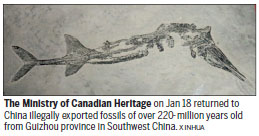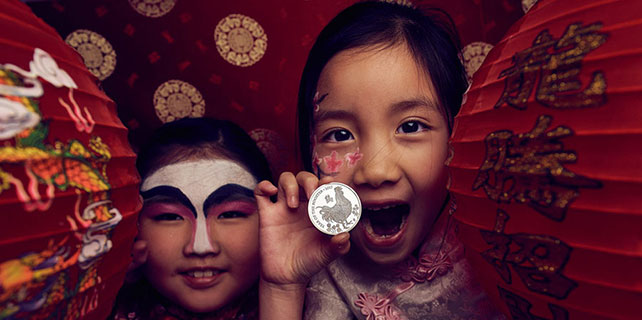Canada returns more of China's ancient relics

What country wouldn't want to get back its 220 million-year-old fish fossil?
That was one of the heritage objects Canada returned to China last week. Underscoring the strong cooperation between the two countries, it was the third return of cultural property to China by the government in Ottawa.
Earlier in January, Mlanie Joly, minister of Canadian heritage, had met with Liu Yuzhu, director of the State Administration of Cultural Heritage, and confirmed the return of illegally exported cultural property to China. An official ceremony was held in Ottawa on Jan 18.
The significant heritage objects returned are a 220 million-year-old Saurichthys fish fossil from Southwest China's Guizhou province; an early Ichthyosaur fossil, likely dating to the early Triassic period (252 to 247 million years ago) originating from China, and a pair of carved wooden roof supports from southwestern China.
The objects were illegally exported from China and were held in Canada by the Canada Border Services Agency and the RCMP. China claimed the objects as cultural property and requested their return.
Wang Wentian, charge d'affair at the Chinese embassy in Canada, accepted the transfer letter from Hubert Lussier, assistant deputy minister, citizenship, heritage and regions, of the Department of Canadian Heritage.
"We appreciate the Canadian government returning the heritage objects to China," Wang said. "It shows a responsible attitude for Canada to fulfill UNESCO's convention (and) demonstrates the cooperation between our two countries in combating the smuggling of cultural relics."
Wang said it helped by the achievements from exchange visits. Premier Li Keqiang traveled to Canada in September for talks with Canadian Prime Minister Justin Trudeau.
The two men agreed to start exploratory trade talks on a free trade agreement and pledged to double bilateral trade by 2025. They also reached an agreement to try to solve a dispute over Canadian canola exports by 2020.
Li said China would lift a ban on imports of bone-in beef less than 30 months old. It was a reflection of "China's commitment to, and China's goodwill to, farmers and producers in Canada", the premier said in September.
Lussier explained Canada's commitment to cooperation on cultural heritage objects.
"Our Cultural Property Export and Import Act of 1977 enabled Canada to become a party to the (UN) convention and empowers the Department of Canadian Heritage to protect Canada's own objects of cultural and historical significance and to prevent the illicit import of cultural property to Canada," Lussier said. "Since that time, our country has defended the convention's assertion that the protection of cultural heritage can be effective only if organized both nationally and internationally among states working in close cooperation."
He said that "this return demonstrates Canada's ongoing commitment to prevent the illicit traffic of cultural property and to ensure its return to its country of origin. It is an example of the successful cooperation of government departments and agencies working together to enforce the Cultural Property Export and Import Act."
Canada and China are signatories to the 1970 UNESCO Convention on the Means of Prohibiting and Preventing the Illicit Import, Export and Transfer of Ownership of Cultural Property. Under the onvention, participating states agree to assist each other in the recovery of illegally exported and stolen cultural property.
"Canada is pleased to return these significant heritage objects to the government of the People's Republic of China in keeping with our treaty obligations under the 1970 UNESCO convention on illicit traffic in cultural property," said Joly. "As evidenced by the Canada-China Program of Cultural Cooperation, which was renewed by the prime minister last fall, Canada and China share a commitment to protect our respective heritage and to collaborate in that protection."
renali@chinadailyusa.com









